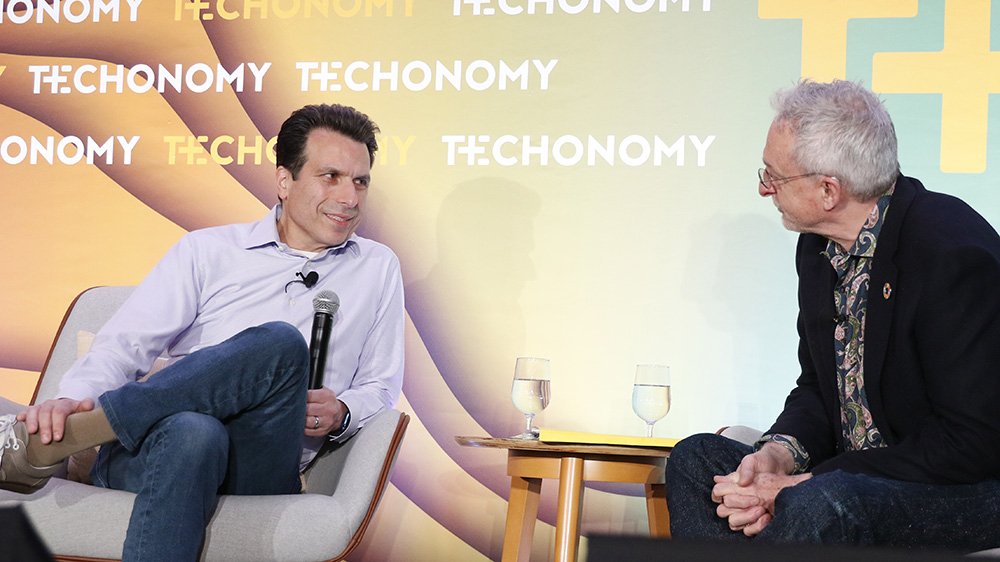From Elon Musk to Mark Zuckerberg, the titans of tech today have more notoriety than movie stars of yore and, often, the egos to match. But at what point does idolatry—within the culture of tech and beyond it—and internal self-regard get in the way of progress rather than bolster it?
This was the subject of Techonomy founder David Kirkpatrick’s conversation with Autodesk CEO Andrew Anagnost at Techonomy 22, which took place November 13-15 at the Fairmont Sonoma Mission Inn & Spa.
Within moments of welcoming Anagnost to the stage, Kirkpatrick dove right in. “Do you think tech has an ego problem?”
“I do,” replied Anagnost, who used the phrase “celebrity technologist” to characterize leaders known as much for their personalities as innovations—and who may prioritize image over achievements. “I think it’s becoming a real danger right now. Because when you start ending up with ego driven initiatives—things that are meant to achieve notoriety, be accepted in the cool crowd—people start pursuing results at all costs. Which leads to people not thinking about the consequences on the end user. It also leads to get-rich-quick schemes.”

Kirkpatrick and Anagnost cited Sam Bankman-Fried, the founder of crypto exchange FTX who was arrested on fraud charges in December, as an example of such perils.
“Now, you might say, ‘Wait a second, we had Steve Jobs,’” Anagnost continued, returning to the more general topic. “There’s tons of big egos in tech. But it’s very different now.”
“Is the thing you think that made it different just the sheer amount of money that got involved?” Kirkpatrick asked.
Anagnost replied that it was two things. Yes, “The velocity at which you can make money, which attracts a lot of people that aren’t necessarily passionate about tech but about the cash register.” But what makes it more concerning is the impact tech breakthroughs can now have—the speed with which an innovation can be created and the breadth of society it can affect. Anagnost pointed out that in the early days of, say, Apple, power wasn’t as aggregated in specific niches. “Personal computers at that time were touching a small smidgen of the economy. Today if you want to get notoriety in tech you’ve got to take down 10% of the economy.”
Kirkpatrick laughed, ruefully. Then he pivoted to the subject of multibillion-dollar software company Autodesk, where Anagnost puts his ideas into action. Autodesk, a leader in 3D design and make technology, counts New York’s One World Trade Center and many of Avatar’s visual effects among projects built with its software.
Anagnost said changes in the cloud and artificial intelligence are two factors turbo-charging innovation in his sector. “The challenge here is that we could go whole hog on automation in the cloud [for example] and actually undermine an entire industry.”

“As a matter of fact,” he continued, “some of our customers are afraid that we’re…going to suddenly be able to automatically crank out a design for a building and dis-intermediate a whole segment of the market.”
Even if and when such things come to fruition, Anagnost said, he believes in the idea of proceeding carefully. “I think the ethos—that is often an ego driven ethos—is ‘Let’s cram the disruption through.’ I love disruption…But. This notion that that’s the only way you can make that happen, I’d like to challenge that…Has it really created a path to getting things done or has it created a lot of mistakes that people had to circle back and fix?”
Kirkpatrick asked for details on an alternative approach. “How do you run Autodesk differently because you worry about these things?”
“We actually try to think through the disruptions we’re going to create. I’ll call it, perhaps tritely, having empathy for the people that are going to get disrupted by some of these technologies,” Anagnost responded. “It’s not like we’re not going to do it. No, we’re going to do it. But we ask ourselves, ‘How do we mitigate the impact?’… And we try to invest in the ecosystem ahead of the impact.”
Kirkpatrick turned to Anagnost’s interest in job creation and particularly his work to make sure lower paid positions, which are vulnerable to being outmoded by tech advances, can be replaced with other opportunities.
Anagnost nodded. “We have spent a lot of time trying to invest in especially community college level education, which is going to be a critical feeder of some of the skill-sets that people are going to need to thrive in the new technologies.”
With that, Kirkpatrick opened the conversation to audience questions. A woman raised her hand.
“I think that the Four Horsemen of technology are what I call ‘the four F words’,” she said. “Fear, fame, fortune, and fanaticism.”
Anagnost cracked up.
“How do you make the other side—the empathy, the forethought, the look at the impacts—how do you motivate [people to subscribe to those things instead]?” she asked.
Anagnost, serious again, told her it’s surprisingly straightforward. “The way I figured this out in my career is that, you know what? Time to impact actually goes up if you do this a little bit more collaboratively… If you want to build to last, and I like to build to last, then you want to be a little bit more empathetic and humble.”














